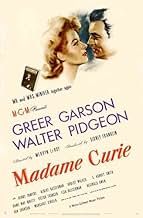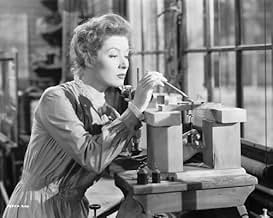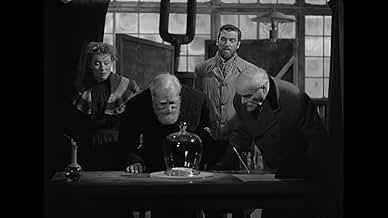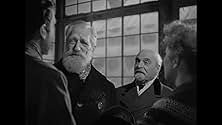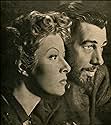Despite himself, accomplished physicist and avowed bachelor Pierre Curie falls for brilliant student Marie, and together they embark on the discovery of radium.Despite himself, accomplished physicist and avowed bachelor Pierre Curie falls for brilliant student Marie, and together they embark on the discovery of radium.Despite himself, accomplished physicist and avowed bachelor Pierre Curie falls for brilliant student Marie, and together they embark on the discovery of radium.
- Nominated for 7 Oscars
- 3 wins & 7 nominations total
- Madame Eugene Curie
- (as Dame May Whitty)
- Tall Woman
- (uncredited)
- Man at Accident
- (uncredited)
- Swedish Queen
- (uncredited)
- Lecturer
- (voice)
- (uncredited)
- Professor
- (uncredited)
Featured reviews
"A Wonderful Collaboration"
In the late nineteenth century, a beautiful young Polish woman enrols at the Sorbonne. Mademoiselle Sklodowska is a brilliant physicist, and before long she has been attached to Doctor Curie, the shy boffin with the large laboratory. One day, the lives of both scientists are profoundly affected when a colleague shows them the strange radiant properties of certain rocks. Marie and Pierre decide to devote their careers to understanding how minerals can cause changes in a photographic plate.
Mervyn LeRoy ("I Am A Fugitive", "Gold Diggers", etc) directed this conservative little biopic with quiet professionalism. If the film never truly hits the heights, it has to be said that it is a near flawless piece of workmanship. The writers, Osborne and Rameau, produced a literate and well-paced screenplay, and the incipient romance between the two shy scientists is depicted with delicacy and gentle humour.
Doctor Curie gradually falls for his gifted student. The graduation ceremony is cleverly depicted as a crowded sell-out, which the absent-minded doctor almost misses. We hear, but do not see, Marie receive the first prize.
The critical point in the relationship comes when Pierre invites Marie to spend a weekend at his parents' country villa. Marie retires to bed, and the agitated Pierre spends the night pacing up and down in his room, not entirely sure what is bothering him. When he finally resolves to propose marriage, we see him ascend the stairs walking away from the camera: this emphasises his nervousness, because he is moving 'out there'. After Marie accepts, Pierre is shot from the reverse angle going back down the stairs - now he 'belongs' to Marie, and we see him from her point of view. The scenes which follow are deeply attractive. The studio sets of the villa garden and Grenoble are sumptuous, and the location shots of the honeymoon absolutely idyllic. The hard labour back in Paris will seem all the grimmer after this interlude.
The film is almost an hour old before Marie embarks on her discovery of radium. The experiment to separate uranium and thorium is lit from below, resembling the dramatic paintings of Joseph Wright of Derby. Infinite patience was required during the four years of toil which culminated in the preparation of radium, and the film conveys a vivid sense of the Curies' dedication. The new century begins with the gentle glow of the isolated radium sample, a beacon heralding the wonders of the dawning age.
Interesting side issues include the appearance of a very young Robert Walker as David, the lab assistant, and an equally callow Van Johnson as the cub reporter. Some lines in the script were perfectly innocent in their day, but raise a titter now. Telling Marie how much she will like his father, Pierre goes on to add, "And my mother's quite gay - you'll enjoy them both!" When Pierre leaves the house in pouring rain on some purpose of his own, Marie calls after him, "Don't forget your rubbers!"
Marie's reaction to the news of the accident is well done, but her final speech to the Faculty of Science fails to inspire. It is her work that is uplifting, not her oratory, and the film puts this across.
Verdict - Solid, well-made biopic which doesn't quite ignite.
Exceptional biographical film that made me feel as if I was living and persevering through Madame Curie's trial and tribulations myself
I would like to propose that all high school students watch this film at least twice and complete a report on what the film meant to them. Maybe it would inspire even a very small percentage of our future scientists to maintain a semblance of perseverance, get rid of their cell phones and social media presence and remember how difficult life and romance was for Marie and Pierre Curie.
This is a romantic and epic documentary film that all teenagers should enjoy sitting through and learning a bit about the hardships that our predecessors and science leaders endured for our benefit and the better future of all mankind.
A deservedly 8 out of 10 rating
Handsome Bio
Garson and Pidgeon discover radium...tasteful biography...
Their long work in the laboratories finally leads to the discovery of radium--and this is the fascinating story of how they met and married and indulged in their lifelong pursuit of discovery. A young and rather miscast Robert Walker plays a fellow lab worker. Van Johnson has a few brief moments toward the end, as does Margaret O'Brien. But the focus is on Greer Garson and Walter Pidgeon and they both deliver Oscar nominated performances.
This is one of the better screen biographies and one that has been sorely neglected over the years. Watch for my career article on GREER GARSON to appear in an upcoming issue of FILMS OF THE GOLDEN AGE.
MGM's smoothest, creamiest entry for 1943.
The first third of the film is in many ways the best: a very funny and sensitive depiction of the courtship of two gauche scientists. Often filmed in long-shot on beautifully detailed, cavernous sets, we see Garson and Pigeon sometimes isolated in space, sometimes haltingly moving through crowds, tentatively finding their way to each other. Though Mervyn Leroy could be a stolid director, here he shows great delicacy and judgment and he perfectly sets a mood of gentle comic romance.
The middle third deals with the engrossing scientific mystery that led to the discovery of radium. The lightness of touch and the humor of the first third are not entirely abandoned here, but there is a greater seriousness and a kind of reverence for knowledge and scientific endeavor that is virtually absent from films today (the exception would be A BEAUTIFUL MIND, which I kind of hated). There are some striking visuals, including a tracking shot across hundreds of bowls of evaporating chemicals and a haunting image of a glowing dish of radium in a large, dark shed.
The last third is the dullest and most conventional portion of the film: fame and celebration for the Curies and a renewal of their love just before Pierre died prematurely in a traffic accident. The high point here is what surely won Pigeon his Oscar nomination for Best Actor: the speech to a jeweler in which he describes the beauty of his wife just before his untimely death. There is also the evocative image of a wet umbrella broken under a wagon wheel.
Of course, what you think of this idealistic, creamy and sure-footed vehicle (which must have packed 'em in at Radio City Music Hall) depends entirely on what you think of Greer Garson, as well as your opinion of the popular Garson-Pigeon screen team. Their looks and personalities were perfect matches, templates of feminine and masculine 'virtues'. There was nothing sexy about them but they suggested a platonic ideal of what every child would wish their parents to be. They were the last stars to make middle age look glamorous and desirable.
As for me, I like her. Her mannerisms are kept to a minimum in this restrained performance. The famous tinkling laugh, the arched eyebrow, the flaring nostrils -- so overused in some other films -- are not much in evidence here. But her best qualities are: the sense of intelligence, of quiet watchfulness, self-possession, dignity and tact are all here. The source of her screen personality has always seemed sane and tranquil, relaxing to watch and finally, to me, admirable. I can understand why some people (like critic Pauline Kael) felt that Hollywood's ladylike stars presented an outdated, oppressive ideal for women. But from this distance, Garson's confidence and ease, her capability, her self-containment all strike me as civilized and even sophisticated traits. She played grownups, and we have never had enough of those on screen . . .
Did you know
- TriviaAs a proper English lady, Greer Garson insisted on having tea served on the movie set every day at 4 o'clock. Once, while filming a scene, the actors were interrupted by a sharp whistling sound. Director Mervyn LeRoy shouted, "Cut! What the hell is that noise?" A voice responded from offstage, "It's Miss Garson's tea kettle, sir!"
- GoofsThroughout the film Marie Curie is referred to as a blonde, but Greer Garson was naturally red-headed and no attempt was made to lighten her hair to make her look blonde. Her hair photographed the dark grey common to redheads in black-and-white films of this vintage.
- Quotes
[last lines]
[Madame Curie addresses a large gathering of scientists]
Marie Curie: Even now, after twenty-five years of intensive research, we feel there is a great deal still to be done. We have made many discoveries. Pierre Curie and the suggestions we have found in his notes, and his thoughts he expressed to me have helped to guide us to them. But no one of us can do much. Yet, each of us, perhaps, can catch some gleam of knowledge which, modest and insufficient of itself, may add to man's dream of truth. It is by these small candles in our darkness that we see before us, little by little, the dim outline of that great plan that shapes the universe. And I am among those who think that for this reason, science has great beauty and, with its great spiritual strength, will in time cleanse this world of its evils, its ignorance, its poverty, diseases, wars, and heartaches. Look for the clear light of truth. Look for unknown, new roads. Even when man's sight is keener far than now, divine wonder will never fail him. Every age has its own dreams. Leave, then, the dreams of yesterday. Youth, take the torch of knowledge and build the palace of the future.
- ConnectionsFeatured in MGM/UA Home Video Laserdisc Sampler (1990)
- SoundtracksTwinkle, Twinkle, Little Star
(uncredited)
from the French melody "Ah ! vous dirai-je, Maman" (music first published 1761)
Played on piano by Linda Lee Gates and Marie Louise Gates
- How long is Madame Curie?Powered by Alexa
Details
- Runtime
- 2h 4m(124 min)
- Color
- Aspect ratio
- 1.37 : 1


